
Iain Dale 10am - 1pm
4 May 2021, 10:23 | Updated: 4 May 2021, 11:06
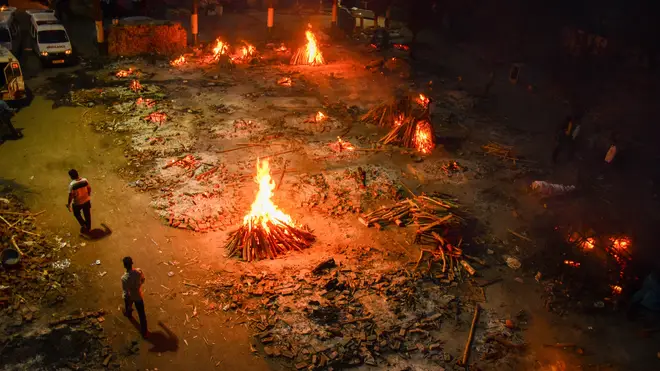
A top expert has warned the coming weeks in India will be "horrible" as Covid-19 infections and deaths mount with alarming speed.
The country has witnessed scenes of people dying outside overwhelmed hospitals and funeral pyres lighting up the night sky.
Dr Ashish Jha, dean of Brown University's School of Public Health in the US, said he is concerned about claims by Indian politicians that things will improve in the next few days.
READ MORE: Australia makes travelling from India a criminal offence as Covid cases surge
He said: "I've been trying to say to them, 'If everything goes very well, things will be horrible for the next several weeks. And it may be much longer'."
Dr Jha said the focus needs to be on "classic" public health measures: targeted shutdowns, more testing, universal mask-wearing and avoiding large gatherings.

'I have family in India and they're not coping well at all'
The surge in infections in India, which began in February, has been blamed on more contagious variants of the virus as well as government decisions to allow huge crowds to gather for Hindu religious festivals and political rallies before state elections.
The deaths also reflect the fragility of India's health system. Prime Minister Narendra Modi's party has faced criticism for pointing out that the underfunding of health care has been chronic.
READ MORE: Under-fire India PM Modi loses in elections as Covid cases surge
India's top health official, Rajesh Bhushan, refused to speculate last month as to why authorities were not better prepared.
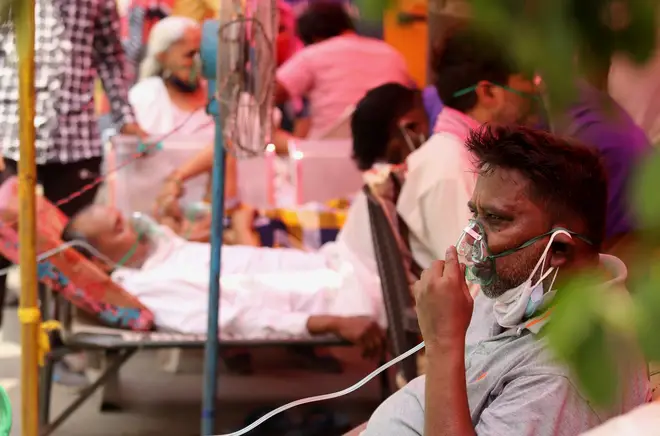
But the cost is clear: People are dying because of shortages of bottled oxygen and hospital beds or because they could not get a Covid-19 test.
This was all the more reason for authorities to use the several months when cases in India declined to improve the system, Dr Vineeta Bal of the Indian Institute of Science Education and Research said.
"Only a patchwork improvement would've been possible," she said. But the country "didn't even do that".

Top Indian politician defends government response to new wave of pandemic
Now authorities are scrambling to make up for lost time. Beds are being added in hospitals, more tests are being done, oxygen is being sent from one corner of the country to another, and manufacturing of the few drugs effective against Covid-19 is being increased.
The challenges are steep in states where elections were held and unmasked crowds probably worsened the spread of the virus.
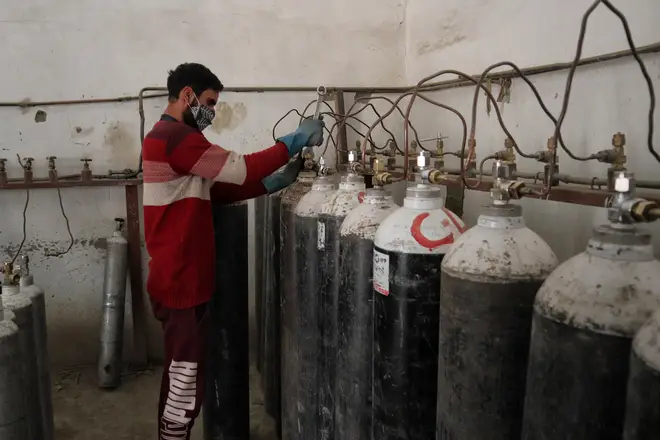
For example, the average number of daily infections in West Bengal state has increased by a multiple of 32 to over 17,000 since the balloting began.
"It's a terrifying crisis," said Dr Punyabrata Goon, convener of the West Bengal Doctors' Forum.
Dr Goon added that the state also needs to speed up its vaccine rollout.

India-based caller tells LBC of the 'real fear' as Covid worsens
The world's largest maker of vaccines is short of jabs as a result of lagging manufacturing and raw material shortages.
Experts are also concerned the prices being charged for jabs will make it harder for the poor to get vaccinated. On Monday, opposition parties urged the government make vaccinations free to all Indians.
India is vaccinating about 2.1 million people daily, or around 0.15% of its population.
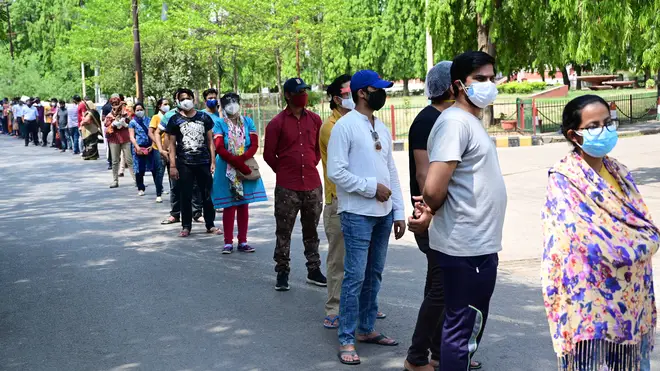
Dr Ravi Gupta, a virus expert at the University of Cambridge, said: "This is not going to end very soon. And really... the soul of the country is at risk in a way."
Coronavirus cases in the country of nearly 1.4 billion surpassed 20 million on Tuesday, nearly doubling in the past three months, while deaths officially passed 220,000.
The numbers are staggering, but the true figures are believed to be far higher, the undercount an apparent reflection of troubles in the health care system.

Shocking and heartbreaking - epidemiologist updates on India
Official death and infection figures are considered unreliable because testing is patchy and reporting incomplete
For example, records of those handling the bodies of Covid-19 victims in New Dehli show 1,680 dead on Sunday.
But in the same 24-hour period, only 407 deaths were added to the official toll from New Delhi.
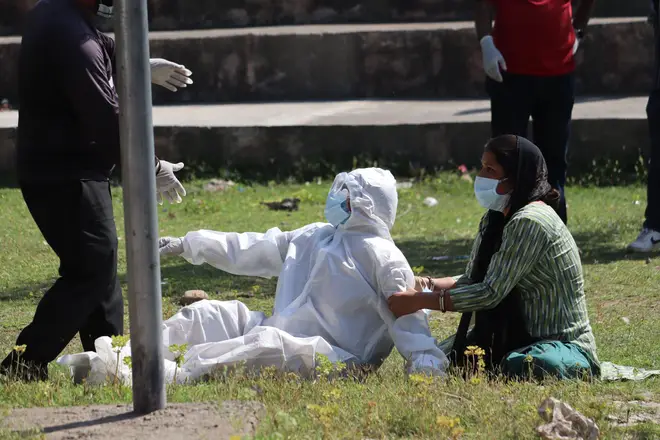
Despite this, the country's official average of newly confirmed cases per day has still soared from over 65,000 on April 1 to about 370,000, and deaths per day have officially gone from over 300 to more than 3,000.
On Tuesday, the health ministry reported 357,229 new cases in the past 24 hours and 3,449 deaths from Covid-19.

Medical volunteer explains devastating Covid situation in India
The India variant - also known as B.1.617 - was first noted internationally in October and first identified in the UK on February 22.
It has 13 mutations including two in the virus' spike protein known as E494Q and L452R.
Two weeks ago, a further 55 cases of the strain were discovered in the UK, bringing the total number of cases to 132.
The variant, which is not yet considered to be a variant of concern, is being investigated to determine if it can spread faster or evade protection given by vaccines.
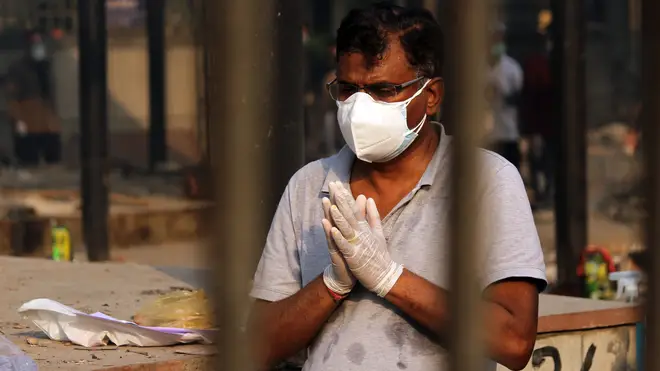
Amid the sharp increase in cases in India and growing concerns the variant could continue to spread in the UK, India was placed on the red list on April 22, effectively banning most travel.
People returning from India must quarantine in a government-approved hotel for 10 days, while anyone who is not a UK or Irish resident or a British citizen will be banned from entering the country if they have been in India in the previous 10 days.
Over the weekend Prime Minister Boris Johnson committed fresh assistance for India as he announced the UK was sending the country a further 1,000 ventilators.
READ MORE: UK rushes to send 1,000 more ventilators to India as Covid surge kills thousands daily
This was in addition to 200 sent last week, in shipments that have included nearly 500 oxygen concentrators.

Did the Government act fast enough adding India to the Red List?
Mr Johnson made the pledge ahead of a call with his Indian counterpart Narendra Modi on Tuesday.
Foreign Secretary Dominic Raab will also meet his Indian counterpart Subrahmanyam Jaishankar this week as he hosts face-to-face meetings with G7 foreign ministers.
Professor Chris Whitty, England's chief medical officer, and Sir Patrick Vallance, the chief scientific adviser, have spoken to their counterparts in India to share the expertise they have gained during the pandemic.
NHS England is also establishing a clinical advisory group to support India's response by sharing knowledge on how to manage outbreaks.